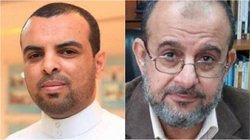 Reporters Without Borders (RSF) says the two journalists who had gone missing in Saudi Arabia are alive and remain in the custody of the kingdom's security agencies in undisclosed locations, shedding light on yet another instance of Riyadh's continued crackdown on free press.
Reporters Without Borders (RSF) says the two journalists who had gone missing in Saudi Arabia are alive and remain in the custody of the kingdom's security agencies in undisclosed locations, shedding light on yet another instance of Riyadh's continued crackdown on free press. RNA - In a press release on Monday, RSF said Marwan al-Muraisi, a Yemeni journalist missing June 2018, and Abdel Rahman Farhaneh, a Jordanian journalist who disappeared in February, were in detention.
Muraisi’s wife said in a tweet that her husband had finally called home and spoke to her for a few minutes after 11 months. This was the first time the journalist had been allowed to contact a family member since his disappearance.
During the call Muraisi was only able to confirm that he was still alive and could not reveal where he was being kept.
In September 2018, RSF and several other organizations signed a letter calling on the Riyadh regime to shed light on his status.
RSF noted that it first learned about Farhaneh’s detention a month ago. The Jordanian national, who is in his sixties, went missing on February 22 in the eastern city of Dammam, where he had been based for more than 30 years.
He was a contributor to Qatari news network Al Jazeera until Saudi Arabia and its allies severed diplomatic relations with Doha. He also covered the Israeli-Palestinian conflict.
According to RSF, the Jordanian embassy informed Farhaneh's family of his arrest. The Saudi authorities had told the embassy that he would be released “soon.” The family was given no precise release date.
Like Muraisi, it was not known where Farhaneh was being held.
More journalists missing in Saudi
RSF said it continued its efforts to release 29 other detained journalists and bloggers from detention by Saudi authorities.
The organization said two journalists were still missing in the kingdom, which is ranked 172nd out of 180 countries in RSF’s 2019 World Press Freedom Index.
Saudi Arabia has gained notoriety for its inappropriate treatment of journalists in the wake of a crackdown by Crown Prince Mohammed bin Salman, who has been locking up dissidents and rivaling princes in a bid to cement his grip on power.
The Riyadh regime has so far executed a significant number of journalists despite international outcry.
The criticism reached its peak after dissident journalist Jamal Khashoggi went missing in the Saudi consulate in Istanbul last October and was later on killed and cut to pieces in a cold-blooded murder.
The Saudi officials first tried to deny the murder but later on admitted that he was killed by agents who had gone "rogue."
The CIA has concluded that bin Salman knew of Khashoggi's murder.
Keith Preston, director of Attackthesystem.com, said Khashoggi's case is proof that freedom of press was non-existent in Saudi Arabia.
"We have to consider that freedom of the press simply doesn't exist in Saudi Arabia," the analyst told Press TV. "Anybody in Saudi Arabia who speaks out against the government is subjected to criminal penalties, imprisonment, torture and even execution."
Noting that Saudi officials had executed young dissidents in the past, the Virginia-based journalist said the kingdom "tolerates absolutely no dissent from its policies."
"Saudi Arabia on a general level is a very retrograde society [where] there is no freedom of press, there is no freedom of speech, there is no democracy and there is no freedom of religion" for followers of anything but Wahhabism, he concluded.
847/940